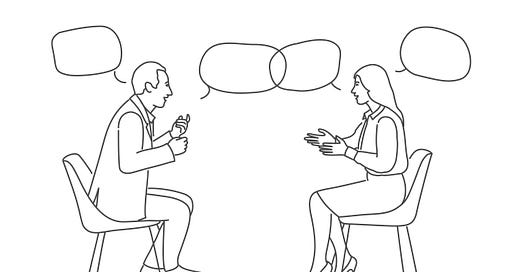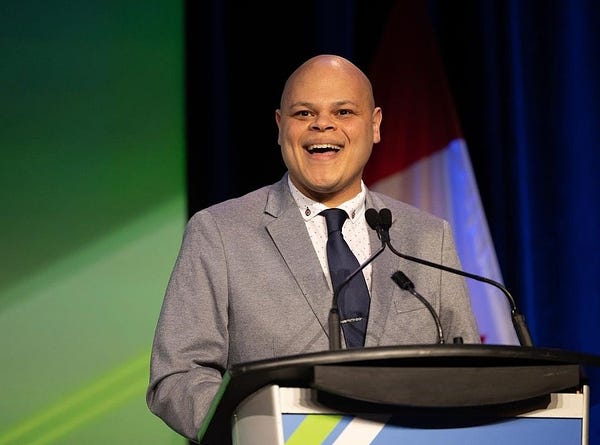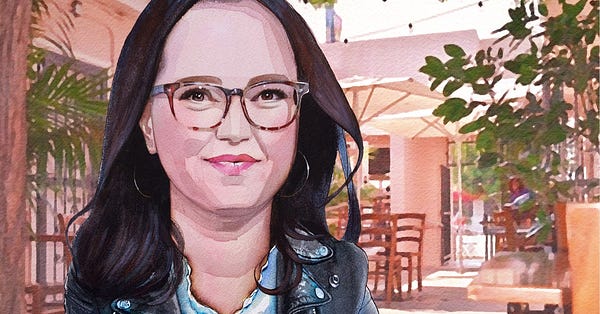Weekend reads: A good day for public dialogue
From a conservative conference in Ottawa to a progressive feminist event in Toronto, viewpoint diversity is alive and well. Plus, six hopeful developments from this week.
This Thursday, I began my day in Ottawa, speaking on the state of the media at a conservative conference, having been invited by Lean Out guest and president of the Canada Strong & Free Network, Jamil Jivani. During a fireside chat, I stressed the need for more viewpoint diversity in the Canadian press. By nightfall, I was back at home in Toronto, at a progressive feminist event hosted by The Trouble Club, listening to the excellent Margaret Atwood and, in the Q&A session, an auditorium of women, reflecting on the overturning of Roe v. Wade. The most memorable quote of the evening came when the always-funny Atwood pointed out that women, a group that’s half the population, naturally hold a wide range of viewpoints — that we are “not a homogeneous pile of yoghurt.”
All told, Thursday was an ideal day for a journalist who values diversity of thought, and it reminded me of a sentiment from Jivani himself, writing in The Toronto Sun:
… it’s important we do not lose hope. There are Canadians across the country who believe in debate and dialogue. Plenty of us still think it’s good to hear different points of view that might challenge our own thinking.
On that note, here’s some other hopeful developments from this week’s news cycle:
Stanford University is taking a strong stand for free speech. This week on the Lean Out podcast, we dug into the recent free speech controversy at Stanford Law, which saw students shout down a conservative judge — and a DEI administrator intervene, asking Judge Kyle Duncan an odd question, “Is the juice worth the squeeze?” On our podcast, we heard from First Amendment lawyer Alex Morey, who has since published an opinion piece at Persuasion making the case that when it comes to free speech, the juice is very much worth the squeeze. Meanwhile, the DEI dean, Tirien Steinbach, who is now on leave, has also weighed in at the Wall Street Journal. And for her part, Stanford Law’s Dean Jenny Martinez has released a lengthy, thoughtful memo that’s well worth reading in full. Here’s a standout passage:
Law is a mediating device for difference. It therefore reflects all the heat of controversy, all the pain and suffering, and all the deeply felt moral urgency of our differences in position, power, and cherished principles. Knowing all of this, I believe we cannot function as a law school from the premise that appears to have animated the disruption of Judge Duncan’s remarks -- that speakers, texts, or ideas believed by some to be harmful inflict a new impermissible harm justifying a heckler’s veto simply because they are present on this campus, raised in legally protected speech, and made an object of inquiry. Naming perceived harm, exploring it, and debating solutions with people who disagree about the nature and fact of the harm or the correct solutions are the very essence of legal work. Lively, candid, civil, and evidence-based discourse in disagreement is not just positive for our community, constituted as it is in difference, it is a professional duty. Observance of this duty matters most, not least, when we are convinced that others haven’t.
A legendary news leader is defending the ideal of journalistic objectivity. If you read this Substack regularly, you know that the ongoing debate within the media on journalistic objectivity is something that I frequently cover. Anyone wanting to understand the nuances of the arguments being made on this issue should read this week’s piece in The Washington Post by Marty Baron, an iconic editor famous for being portrayed by Liev Schreiber in the film Spotlight. Here’s a key passage to marinate on:
The idea is to be open-minded when we begin our research and to do that work as conscientiously as possible. It demands a willingness to listen, an eagerness to learn — and an awareness that there is much for us to know.
We don’t start with the answers. We go seeking them, first with the already formidable challenge of asking the right questions and finally with the arduous task of verification.
It’s not that we know nothing when we embark on our reporting. It is that we don’t know everything. And typically we don’t know much, or perhaps even most, of what we should. And what we think we know may not be right or may be missing important pieces. And so we set out to learn what we do not know or do not fully understand.
I call that reporting. If that’s not what we mean by genuine reporting, what exactly do we mean?
I believe our profession would benefit from listening more to the public and from talking less at the public, as if we knew it all. I believe we should be more impressed with what we don’t know than with what we know — or think we know. In journalism, we could use more humility — and less hubris.
We of course want journalists to bring their life experiences to their jobs. The collective life experiences of all of us in a newsroom are an invaluable resource of ideas and perspectives. But every individual’s life experience is, inescapably, narrow. Life experience can inform us. But, let’s be honest, it can also limit us. There is an immense universe beyond the lives we ourselves have lived. And if there are constraints on our ability to understand a world beyond our own, we as journalists should strive to overcome them.
Baron rejects the notion that the press must abandon old norms in order to protect democracy — an idea advanced by media critic Margaret Sullivan, as covered in my column last weekend — and his argument is compelling.
There is no profession without flaws. There is not one that always fulfills its highest ideals. Journalism is, by no means, an exception. We have often failed, embarrassingly and egregiously. We often did harm: Through errors of commission and errors of omission. Because of haste and neglect. Because of prejudice and arrogance.
But our failures were not ones of principle. They were failures to live up to principle.
We can — and should — have a vigorous debate about how a democracy and the press can serve the public better. But the answer to our failures as a society and as a profession is not to renounce principles and standards. There is far too much of that taking place in today’s America. The answer is to restate our principles, reinforce them, recommit to them and do a better job of fulfilling them.
The next generation is taking up the mantle on our country’s most pressing issues. One of my favourite up-and-coming talents is Aaron Pete, fellow Substacker and host of the Bigger Than Me Podcast. He’s an Allard Law grad and a council member for the Chawathil First Nation in British Columbia. Aaron invited me on his show a few months back. I was impressed by his thoughtful, perceptive questions, and have followed his work ever since. On my trip to Ottawa, I listened to his excellent interview with University of Ottawa professor Michael Geist on Internet freedom. I highly recommend it.
The Canadian mainstream media is doing an excellent job on the Chinese election interference story. While I was in Ottawa, this was the most buzzed-about story, with The Globe and Mail and Global News garnering praise for their coverage — and rightfully so. I have special admiration for Global’s Sam Cooper, whose work I’ve been following for years, since his days investigating Vancouver’s housing crisis. Here’s his latest blockbuster.
The true left is pushing back on “woke” politics. The actual leftists are coming for the identitarian movement that styles itself as leftism. Susan Neiman, author of the new book Left is Not Woke, had a great excerpt published recently at UnHerd. Her book makes the case for universalism over tribalism — and asks an important question: “Which do you find more essential: the accidents we are born with, or the principles we consider and uphold?” Stay tuned, she’ll be joining me on the Lean Out podcast soon. Meanwhile, Lean Out guest Freddie deBoer has just announced his own book, How Elites Ate the Social Justice Movement.
The independent media is on fire. This is good news for everyone — but most especially for the public, as the meteoric rise of independent outlets accomplishes several important things. One, it complicates the dominant narrative. Two, it widens the Overton Window for allowable discussion and debate, forcing the mainstream media to (eventually) contend with growing public awareness on inconvenient and unpopular — and, in some cases, taboo — stories, facts, ideas, and viewpoints. Third, it incentivizes legacy outlets to ask themselves why the public is voting, with its attention and dollars, for an alternative media model. It begs the question: What are independent journalists offering that the establishment press is failing to deliver?
All of the above is to say: Take heart, readers, I’m convinced that our public discourse is, however slowly, returning to some semblance of sanity.









re: Item 6. Just a reminder to everyone that the Canadian government refused for many years to subsidize the failing mainstream media. MSM were having a tough time navigating the change from TV and newspapers to Internet. "Why should I pay for a paper when I can get the internet news for free". Then in 2018 the liberal government abruptly changed course and offered over half a billion dollars in subsidies to 30 MSM and held a meeting to divvy up the money. This was a year before the 2019 election. The conservatives have vowed to not pay any subsidies to MSM. The NDP will never form the government. The only way for the failing MSM to get subsidies is to keep the liberals in power. Now tell me there was no quid pro quo at work here.
I am impressed by your work and that of other independent journalists. It gives me hope.